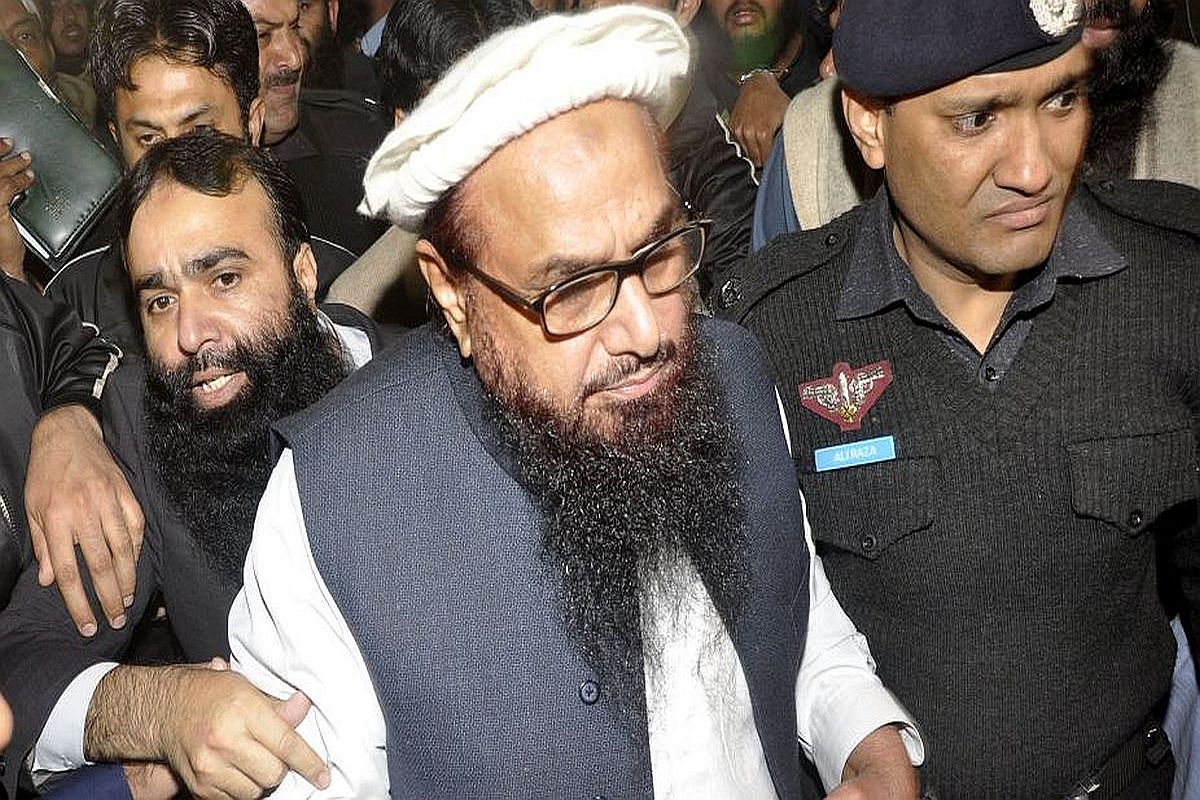LG calls effective for steps to wipe out terrorism from Jammu
Lt. Governor Manoj Sinha, on Thursday, stressed strengthening border security against asymmetric threats due to the porous border with riverine and difficult mountain ranges.
Next week’s Financial Action Task Force (FATF) meeting will review progress made on controlling terror financing and money laundering.

Jamaat-ud-Dawa (JuD) chief Hafiz Saeed. (File Photo: IANS)
In an attempt to show that it is working in accordance with the FATF directives to crack down on UN proscribed terror groups, Pakistan’s Counter-Terrorism Department (CTD) on Thursday arrested four aides of Jamaat-ud-Dawa (JuD) chief Hafiz Saeed.
The arrests come ahead of the Financial Action Task Force’s crucial plenary meeting in Paris next week.
Advertisement
The arrested suspects were Zafar Iqbal, Yahya Aziz, Muhammad Ashraf, and Abdul Salam. The four will appear before a trial court on Friday.
Advertisement
Earlier, the CTD had arrested two suspected terrorists associated with a banned outfit during a raid in Gujranwala. The suspects were arrested during a raid near Alipur Chowk, according to CTD officials. The arrested terrorists were identified as Muhammad Akmal and Ghulam Hussain.
Explosive material, hate literature and cash were seized from their possession. The suspects were reportedly planning to target officers of intelligence agencies, a media report said.
Earlier in July, Mumbai terror attack mastermind Hafiz Saeed was arrested by the Counter-Terrorism Department (CTD) of Pakistan’s Punjab Province and has been on judicial remand ever since.
Following global pressure, Pakistan had on July 3 booked Hafiz Saeed and his 12 accomplices for “terrorism financing” in 23 cases.
The CTD said Saeed and his aides used five trusts to “raise funds for terrorism financing”. The people named in the cases include Hafiz Saeed, his brother-in-law Abdul Rehman Makki, Ameer Hamza and Muhammad Yahya Aziz.
The JuD is the front organisation for the Lashkar-e-Taiba or LeT, which is responsible for carrying out the Mumbai terror attack that killed 166 people. It has been declared as a foreign terrorist organisation by the US in June 2014.
Earlier in February, following diplomatic pressure after the Pulwama terror attack, Pakistan had banned Saeed’s terror outfit Jamaat-ud-Dawa (JuD) and its front Falah-e-Insaniat Foundation (FIF).
Meanwhile, next week’s Financial Action Task Force (FATF) meeting will review progress made on controlling terror financing and money laundering.
Pakistan has been included in the grey list compiled by the FATF.
A Pakistani delegation is scheduled to leave for France on October 13 as Pakistan’s case will be taken up on October 14 and 15.
The Asia-Pacific Group of the global watchdog for terror financing and money laundering, FATF, in a report on Monday said that Pakistan has been quietly unfreezing their accounts and not providing any information about what it is doing to ensure that the money does not go back into terrorist funding.
Islamabad has partially complied with 36 of the 40 parameters set by the Financial Action Task Force (FATF) at the time of the country’s inclusion in the grey list.
The long-awaited 228-page report, titled “Mutual Evaluation Report 2019” was published on Saturday, a week before the FATF is set to announce its decision to remove or retain Pakistan in its grey list.
The APG report stated that Pakistan “has not taken sufficient measures to fully implement UNSCR 1267 obligations against 26/11 mastermind Hafiz Saeed and other terrorists associated with LeT, JuD among other terror groups”.
“Pakistan did not take any actions to freeze the accounts of proscribed organisations during the period under review, with the exception of assets frozen for proscribed organisations that are also listed under UNSC Resolution 1267,” the report said.
The upcoming review of the FATF meeting in Paris will decide the fate of the country with three possibilities — excluding it from grey and put it in the green list, continuing it in grey list with extended period of nine to 12 months and thirdly in worst case scenario putting the country into blacklist, having dire consequences for the country’s economy.
FATF has, meanwhile, warned Pakistan of action against it if the country does not improve its counter-terror financing operations in line with an internationally agreed action plan by October.
Advertisement